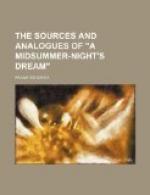Many old women, that then had more wit than those that are now living and have less, said that a fairy had gotten her with child; and they bid her be of good comfort, for the child must needs be fortunate that had so noble a father as a fairy was, and should work many strange wonders. To be short, her time grew on, and she was delivered of a man child, who (it should seem) so rejoiced his father’s heart, that every night his mother was supplied with necessary things that are befitting a woman in child-birth, so that in no mean manner neither; for there had she rich embroidered cushions, stools, carpets, coverlets, delicate linen: then for meat she had capons, chickens, mutton, lamb, pheasant, snite[2], woodcock, partridge, quail. The gossips liked this fare so well that she never wanted company; wine had she of all sorts, muskadine, sack, malmsey, claret, white and bastard; this pleased her neighbours well, so that few that came to see her, but they had home with them a medicine for the fleas. Sweetmeats too had they in such abundance that some of their teeth are rotten to this day; and for music she wanted not, or any other thing she desired.
All praised this honest fairy for his care, and the child for his beauty, and the mother for a happy woman. In brief, christened he was, at the which all this good cheer was doubled, which made most of the women so wise, that they forgot to make themselves unready, and so lay in their clothes; and none of them next day could remember the child’s name but the clerk, and he may thank his book for it, or else it had been utterly lost. So much for the birth of little Robin.
OF ROBIN GOOD-FELLOW’S BEHAVIOUR WHEN HE WAS YOUNG
When Robin was grown to six years of age, he was so knavish that all the neighbours did complain of him; for no sooner was his mother’s back turned, but he was in one knavish action or other, so that his mother was constrained (to avoid the complaints) to take him with her to market, or wheresoever she went or rode. But this helped little or nothing, for if he rode before her, then would he make mouths and ill-favoured faces at those he met; if he rode behind her, then would he clap his hand on his tail; so that his mother was weary of the many complaints that came against him, yet knew she not how to beat him justly for it, because she never saw him do that which was worthy blows. The complaints were daily so renewed that his mother promised him a whipping. Robin did not like that cheer, and therefore, to avoid it, he ran away, and left his mother a heavy woman for him.
HOW ROBIN GOOD-FELLOW DWELT WITH A TAILOR
After that Robin Good-fellow had gone a great way from his mother’s house, he began to be hungry, and going to a tailor’s house, he asked something for God’s sake. The tailor gave him meat, and understanding that he was masterless, he took him for his man, and Robin so plied his work that he got his master’s love.




